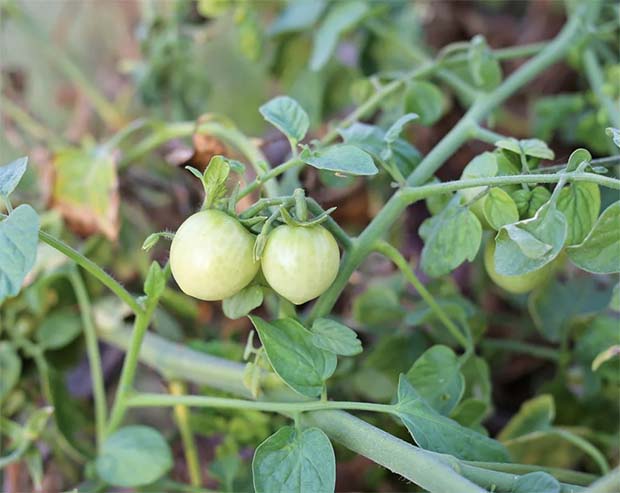You’ve just planted your first container of tomatoes and are excited to eat your own food. Growing tomatoes in containers are pretty common for most urban dwellers. But sometimes the results are not the same as tomatoes grown in gardens.
So, why are container tomatoes so small? The main reason for small tomatoes in containers is because of stressed plants. While there are several other reasons, stress is the main cause.
Tomato plants can be stressed due to extreme weather, insufficient light, water, nutrients, and much more. After all, containers are small and tomato plants might not enjoy the ample space in gardens.
There are just so many reasons why your container tomatoes are so small. Let’s dive deep and see some of the main reasons.
Lack of Sunlight
Tomatoes need plenty of sunlight to grow and produce fruit. If your container is not getting enough sunlight, this could be the cause of your small tomatoes.
Make sure your container is placed in a location that gets at least 6-8 hours of direct sunlight per day. The leaves need a lot of sunlight to make food and produce large fruits.
Poor Soil Quality
Tomatoes need well-draining, nutrient-rich soil to grow and produce fruit. If your container soil is poorly drained or lacks nutrients, it could cause your tomatoes to grow small.
Make sure to use a high-quality potting mix specifically formulated for tomatoes, and consider adding compost or other organic matter to the soil to improve its quality.
Additionally, you can consider a tomato fertilizer and ensure a proper fertilization schedule.
Overcrowding
How many tomato plants do you have in a single container? If you have planted too many tomato plants in a small container, the fruits will be small.
Tomatoes need room to grow and spread their roots, so make sure to give them enough space by planting just one or two plants per container.
What’s more, too many plants in the same container compete for the same nutrients. You might think you’re getting more fruits, but the size will be too small for your liking. Who doesn’t enjoy a bounty harvest?
Insufficient Watering
Tomatoes need a consistent supply of water to grow and produce fruit. Are you watering your container tomatoes regularly or consistently? If not, this is the reason for the small size.
Make sure to water your container tomatoes deeply at least once a week, and more often during hot, dry weather. Tomatoes are heavy feeders and require plenty of moisture in the soil to produce big fruits.
Pest or Diseases
Pests like aphids, mites, and whiteflies can make your tomatoes grow small. The same applies to diseases like a blight that makes tomatoes grow small or fail to produce fruit.
Keep an eye out for signs of pests or disease, and take steps to control them if necessary.
Improper Pruning
Tomatoes benefit from being pruned to encourage healthy growth and fruit production. However, if you prune your tomatoes incorrectly or too aggressively, small fruits develop.
Make sure to follow proper pruning techniques. Only remove suckers (side shoots) that grow from the base of the plant, not the main stem. Don’t prune new leaves that have just formed.
Remove old leaves that are turning yellow as they have little benefit to the plant. Additionally, consider harvesting tomato fruits as soon as they get mature. This leaves food resources for new developing fruits.
Cool Temperatures
Tomatoes are a warm-season crop and prefer temperatures between 70-85°F. If your container tomatoes are exposed to cool temperatures, they will produce small fruits.
Make sure to protect your container tomatoes from cool temperatures, especially at night, by covering them with a blanket or bringing them indoors if necessary.
You can also plant late to ensure they grow in warm conditions.
Poor Pollination
Tomatoes rely on bees and other pollinators to fertilize their flowers and produce fruit. If your container tomatoes are not getting enough pollination, they will produce small fruits or fail to produce fruits at all.
Plant your container tomatoes in a location that is attractive to pollinators. You can also consider hand-pollinating if necessary.
Make sure you combine a few potted flowers near your tomato plants to encourage bees.
Nutrient Deficiencies
Tomatoes need a balance of key nutrients, including nitrogen, phosphorus, and potassium, to grow and produce fruit.
Is your container lacking any of these nutrients? You need a high-nutrient potting mix to ensure maximum yields.
You also need to fertilize your container of tomatoes regularly. Make sure you apply a balanced fertilizer specifically formulated for tomatoes.
Final Verdict
Overall, small-container tomatoes can be caused by a variety of factors. This varies from insufficient sunlight, poor soil quality, overcrowding, insufficient watering, pest or disease issues, improper pruning, cool temperatures, poor pollination, and nutrient deficiencies.
I would suggest you follow the best practices of growing tomatoes in pots from Stephanie, a regular contributor at backyardgardenersnetwork.org, by addressing these issues and taking proper care of your container tomatoes, you should be able to improve their size and fruit production.
